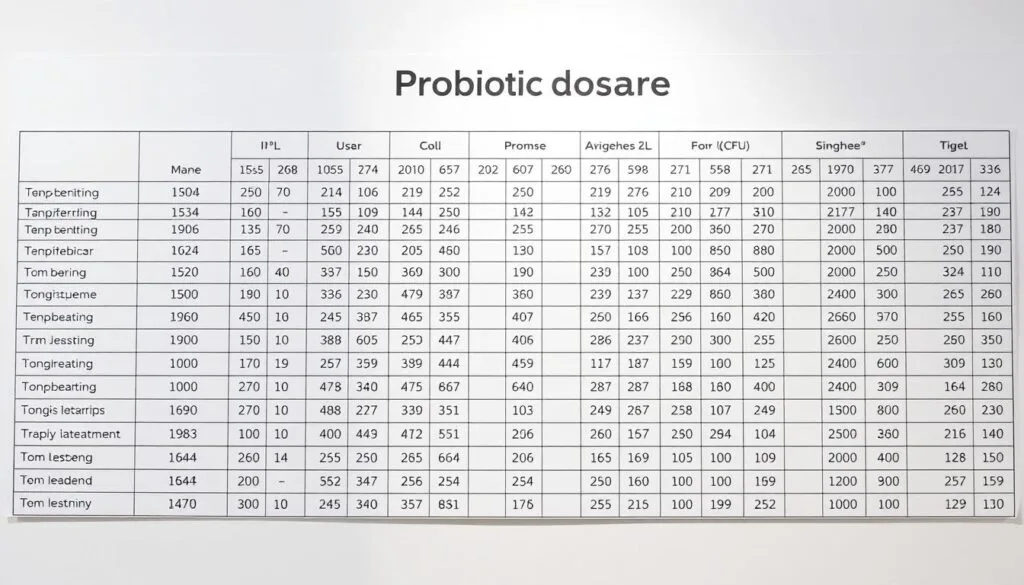Currently Empty: RM0.00
Probiotics have become a cornerstone of modern wellness, offering natural support for digestive balance and immune function. These live microorganisms work symbiotically with the body, but their effectiveness depends heavily on proper dosing. Finding the right amount can feel overwhelming, as individual needs vary based on age, health status, and lifestyle goals.
Research from the International Scientific Association of Probiotics and Prebiotics highlights that at least one billion colony-forming units (CFUs) daily form the baseline for noticeable benefits. However, studies frequently use 10-20 billion CFUs to address common digestive concerns. Higher concentrations, like 50-100 billion CFUs, are gaining attention for targeted support in clinical settings.
Understanding product labels plays a vital role in choosing supplements. CFU counts, strain diversity, and expiration dates directly impact potency. For instance, blends containing Lactobacillus or Bifidobacterium often show stronger gut health correlations. Pairing this knowledge with personal health objectives helps tailor an effective regimen.
Key Takeaways
- Probiotic effectiveness depends on consuming adequate CFUs, typically starting at one billion daily.
- Most research supports 10-20 billion CFUs for general digestive and immune support.
- Higher CFU products (50-100 billion) may benefit specific health conditions under professional guidance.
- Strain selection and label transparency significantly influence supplement quality.
- Personal factors like age and lifestyle determine ideal dosage requirements.
Understanding Probiotics and Their Benefits
In the bustling ecosystem of your gut, trillions of microorganisms work together to keep you healthy. These tiny allies—primarily beneficial bacteria and some yeasts—form a protective network that influences everything from nutrient absorption to disease resistance. Scientists estimate the average person’s gut houses over 300 types of bacteria, creating a dynamic environment called the microbiome.
What Are Probiotics?
Probiotics are live microorganisms that provide health benefits when consumed in sufficient quantities. To qualify as probiotics, they must survive digestion, have proven scientific benefits, and exist in adequate amounts. Common strains like Lactobacillus (found in yogurt) and Bifidobacterium help maintain the ideal 85:15 balance of good-to-bad bacteria in your gut.
These microbes perform critical tasks: breaking down fiber, producing vitamins B and K, and neutralizing harmful pathogens. When this balance tips, symptoms like bloating or irregular bowel movements often appear. Probiotics act as reinforcements, crowding out unwanted bacteria and strengthening intestinal barriers.
The Role of Probiotics in Digestive and Immune Health
A healthy microbiome supports digestion by breaking down complex carbohydrates and regulating bowel movements. Nearly 70% of immune cells reside in the gut, making probiotics vital for immune function. They stimulate antibody production and enhance the body’s ability to identify threats.
Specific strains offer unique advantages. For example, Saccharomyces boulardii, a beneficial yeast, helps combat diarrhea. By understanding these differences, you can select supplements or fermented foods that target your health goals effectively.
Exploring the Recommended Dose of Probiotics
How much should you take to support your gut? The answer lies in understanding colony forming units (CFUs), the measurement that determines a supplement’s strength. These units represent live microbes ready to work in your system.

Standard Dosage Guidelines and CFU Explained
Most adults thrive with 10-20 billion CFUs daily for digestive wellness. Children and infants require smaller amounts tailored to their developing systems. Here’s a quick guide:
| Age Group | Daily CFU Range |
|---|---|
| Adults | 10-20 billion |
| Children (4-17) | 5-10 billion |
| Toddlers | 2-4 billion |
| Infants | 1-2 billion |
While one billion CFUs serve as the minimum, higher amounts often deliver better results. Quality matters too—look for products listing CFUs at expiration rather than at production.
Balancing Quantity and Quality
More CFUs don’t always mean better outcomes. Strain survival through stomach acid proves critical. Multi-strain blends with Lactobacillus or Bifidobacterium often outperform single-strain options.
Storage conditions and manufacturing dates impact potency. Always check expiration labels and avoid heat-exposed products. Smart shoppers compare CFU counts against price to find true value.
Clinical Insights and Research Findings
Cutting-edge research continues to reshape our understanding of how microbial allies impact human wellness. Scientists now explore how varying doses and strains deliver distinct benefits across different health scenarios. This evolving knowledge helps refine guidelines for probiotic-rich foods and supplements.
Highlights from Recent Probiotic Studies
Clinical trials reveal fascinating patterns. Most healthy adults see improvements with 10-20 billion CFUs daily for immune and digestive support. However, studies now test formulations containing 50-100 billion CFUs for targeted applications like post-antibiotic recovery.
For example, research on antibiotic-related diarrhea used 100 billion CFUs daily to rebuild gut defenses. Irritable bowel syndrome trials show even wider ranges—some participants responded best to 20 billion CFUs, while others needed 350 billion.
| Condition | CFU Range | Research Focus |
|---|---|---|
| General Wellness | 10-20B | Immune modulation |
| Antibiotic Recovery | 50-100B | Microbiome restoration |
| IBS Management | 20-350B | Symptom reduction |
Interpreting Dose-Response Research
Not everyone benefits from maximum CFUs. Some studies found lower doses worked better for mild digestive discomfort. This variability highlights why personalized approaches matter more than universal protocols.
Time plays a crucial role—many trials required 4-8 weeks to show measurable changes. Consistent use often proves more impactful than short-term megadoses when taking probiotics. Researchers emphasize tracking individual responses through food diaries or symptom logs.
These findings confirm there’s no single “best” amount. Partnering with healthcare providers helps match CFU counts and strains to your unique biology and health goals.
Practical Steps for Incorporating Probiotics into Daily Life
Building a gut-friendly routine doesn’t require complex strategies. Start by evaluating your existing habits and preferences. Many find success through simple swaps, like replacing sugary snacks with probiotic-rich alternatives or setting daily reminders for supplement intake.

Choosing Between Supplements and Probiotic Foods
Fermented foods offer a tasty way to boost gut health. Yogurt with live cultures, tangy kimchi, or fizzy kefir provide natural microbial diversity. These options deliver extra nutrients like calcium and vitamin K, supporting overall wellness beyond digestion.
Supplements solve the guessing game of CFU counts. Quality products list specific strains and guaranteed potency through expiration dates. For those targeting particular concerns—like occasional bloating—tailored formulas often work faster than food sources alone.
Here’s a quick comparison:
| Option | Benefits | Considerations |
|---|---|---|
| Food Sources | Natural nutrients + probiotics | Variable CFU counts |
| Supplements | Precise dosing | Require brand research |
Consistency matters most. Whether adding sauerkraut to meals or taking a daily capsule, regular intake helps beneficial bacteria thrive. Some people combine both approaches—using foods for maintenance and supplements for targeted support.
Track progress through simple notes. Observe changes in digestion, energy levels, or immune responses over 4-6 weeks. Adjust your approach based on these personal insights to create a sustainable gut health routine.
Personalizing Your Probiotic Regimen
Tailoring probiotics to individual needs unlocks their full potential. Age, health status, and lifestyle shape how your body interacts with these beneficial microbes. A one-size-fits-all approach rarely works for maintaining microbiome balance.
Age-Based and Condition-Specific Guidance
Children and adults require different strategies. Younger bodies need smaller amounts to support their developing systems. For example, school-aged children thrive with 5-10 billion CFUs daily, while infants under one year should only receive 1-2 billion. Always consult a pediatrician before giving probiotics to children.
| Group | Daily CFUs | Special Conditions |
|---|---|---|
| Adults | 10-20B | General wellness |
| Children (4-17) | 5-10B | Immune support |
| Ulcerative Colitis | Up to 900B | Under medical supervision |
Tracking Your Body’s Response
Notice changes in digestion and energy levels over time. Improved bowel regularity and reduced bloating often signal proper dosage. Some people experience initial mild symptoms as their microbiome adjusts—this usually fades within a week.
Take probiotics at the same time daily for consistent results. If targeting specific issues like antibiotic recovery, temporarily increase CFUs under professional guidance. Gradually reduce intake once desired effects stabilize to find your maintenance level.
Expert Guidance from Wellness Concept
Navigating probiotic choices becomes simpler with expert support. Wellness Concept helps people find solutions tailored to their unique gut needs. Their team understands how medications, diets, and lifestyles influence digestive balance.
Personalized Support When You Need It
Connect via WhatsApp at +60123822655 during business hours: Monday-Friday 9:30 am-6:30 pm, Saturday-Sunday 10 am-5 pm. Whether starting probiotics or adjusting your regimen, their specialists explain strain benefits and CFU ranges for your health goals.
Building Lasting Gut Health
Wellness Concept prioritizes safe, science-backed approaches. They guide customers in selecting products that complement existing medications while promoting a healthy gut. Clinical research shows personalized plans yield better results than generic solutions.
Those with specific digestive system concerns receive tailored advice. The team collaborates with healthcare providers to ensure supplements align with individual needs. Start your journey toward balanced gut health with trusted expertise.
FAQ
What are CFUs, and why do they matter in probiotic supplements?
CFUs, or colony-forming units, measure the number of viable bacteria in a product. Higher CFUs—like 10–100 billion—may support digestive health, immune function, or specific conditions. However, quality strains and proper storage also influence effectiveness.
Can probiotic-rich foods replace supplements?
Fermented foods like yogurt (e.g., Siggi’s), kefir, or kimchi provide natural strains but often lack measured CFUs. Supplements like Garden of Life or Renew Life offer precise doses, making them better for targeted needs. Combining both can enhance gut microbiome diversity.
How do age and health conditions affect probiotic needs?
Children typically benefit from 1–5 billion CFUs (e.g., Florastor Kids), while adults may use 10–50 billion daily. Conditions like IBS might require 100 billion CFUs temporarily. Always consult a healthcare provider before adjusting intake, especially with medications or weakened immunity.
Are there risks to taking too many probiotics?
Overconsumption may cause bloating or gas in sensitive individuals. Start with lower CFUs (5–10 billion) and gradually increase. Products like Align or Culturelle balance strains to minimize discomfort while promoting a healthy gut.
How long does it take to notice probiotic benefits?
Effects vary—some experience improvements in digestion within days, while immune or mood benefits might take weeks. Consistency matters: daily use of trusted brands like Bio-K+ or Ritual Synbiotic+ supports long-term microbiome balance.
Can probiotics interact with medications?
Certain antibiotics or immunosuppressants may reduce probiotic efficacy. Space intake 2–3 hours apart from medications. Brands like Seed DS-01® design formulations to coexist better with prescriptions, but medical advice is essential.
What should I look for in a high-quality probiotic?
Seek products with clinically studied strains (e.g., Lactobacillus rhamnosus GG), CFUs listed at expiration (not manufacture), and delayed-release capsules. Brands like NOW Probiotic-10 or MegaFood MegaFlora meet these criteria for reliable digestive and immune support.


